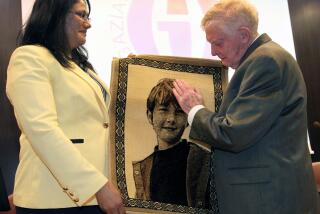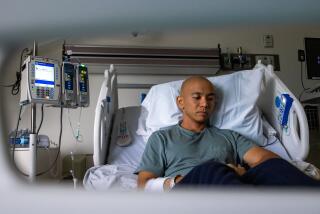The Gift of Life
- Share via
Jose Nogueiras clutches a Thanksgiving card dated Nov. 23, 1998.
“If my house were on fire,” he said, “this is the one thing I would come back inside to get.”
Nogueiras speaks with great emotion about the card, simply signed in blue ballpoint pen: “Recipient.”
It reads, “Hi Pal: I have passed 100 days with high marks. I am on my 132nd day after the transplant. Thank you.”
Nogueiras will probably never meet the writer. But if he does, he wants to play ball with him.
“I don’t have any siblings,” he said, “but I do now. I have this brother.”
For the 32-year-old Arleta resident, donating his bone marrow two years ago to an anonymous 19-year-old with leukemia was the best thing he has ever done.
“Nothing will ever top it,” he said.
Nogueiras, who is of mixed Asian descent, decided to make the donation after seeing his mother suffer from kidney failure. She is now waiting for a kidney transplant from a Filipino donor.
“I made him promise not to give me his kidney,” said his mother, Soledad. “He’s just a good boy. He’s always been giving away things.”
It turned out mother and son did not have compatible blood types. But he was not about to give up. He heard a radio appeal for donations of bone marrow--a precious commodity extracted from the pelvic bone of healthy donors to give intravenously to patients with leukemia.
He found a bone marrow drive at a local office building, signed up, answered some questions and gave a vial of blood.
Donors do not actually give the marrow until a recipient is found. Nogueiras moved on with his life, studying criminal justice at Cal State Los Angeles. He had nearly forgotten about registering when he received an urgent letter 1 1/2 years later about the teen in need.
“I thought the likelihood that I would actually give would never happen,” he said recently. “A normal person like me saved a life.”
But there are many who die waiting, said Sharon Sugiyama, a director of Asians for Miracle Marrow Matches, which is based in Los Angeles and Orange counties.
Although there are nearly 4 million potential donors registered nationwide, only 200,000 are of Asian or Pacific Islander descent.
“Minority patients have a third less chance of finding a potential match,” Sugiyama said. “There is a real human need.”
An official recruitment arm of the National Bone Marrow Donor program, called A3M, is responsible for encouraging more Asians and Pacific Islanders to become donors. Other people of color and mixed ethnicities also are encouraged to donate.
“More minorities in the past few years have received transplants because the diversity of the registry has increased,” Sugiyama said.
A3M is holding bone marrow drives through June seeking potential donors of Asian or Pacific Islander descent. Such an event will be held Sunday, May 21 from 12:30 to 3 p.m. at Woodland Hills United Methodist Church, 5650 Shoup Ave. Call (818) 346-1617 or (888) A3M-HOPE for information.
Since the surgery in July 1998, Nogueiras has not been called to donate again, but said he hopes he will be. While he waits, he volunteers his time coordinating drives for A3M and speaks at churches and health fairs about the shortage of bone marrow for minorities.
He also is waiting to see if he will ever hear again from the teen whose life he saved. For now, the recipient has chosen to remain anonymous. And that’s OK with Nogueiras.
“I did my job, and now I must move on,” he said. “If my recipient ever shows up one day, then we can shake hands.”
*
Personal Best is a weekly profile of an ordinary person who does extraordinary things. Please send suggestions on prospective candidates to Personal Best, Los Angeles Times, 20000 Prairie St., Chatsworth 91311. Or fax them to (818) 772-3338. Or e-mail them to valley.news@latimes.com.
More to Read
Sign up for Essential California
The most important California stories and recommendations in your inbox every morning.
You may occasionally receive promotional content from the Los Angeles Times.













